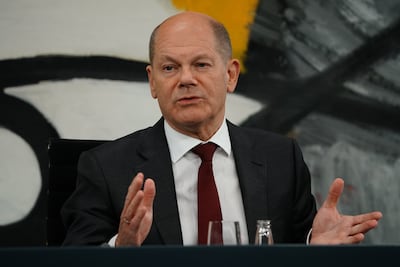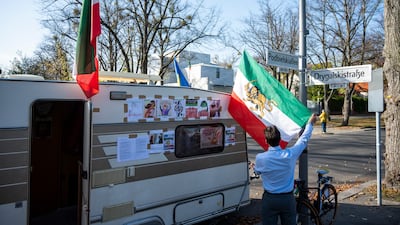Germany has been urged to tighten the screw on the Iranian regime after Chancellor Olaf Scholz was accused of a half-hearted response to weeks of women’s rights protests.
One German MP told The National that top officials linked to the purge on protests in Iran should not be able to send their children to European universities.
Another said Germany should use its G7 presidency to rethink the West’s entire approach to Iran.
Also under discussion is the possible blacklisting of the Islamic Revolutionary Guard Corps as a terrorist group.
The IRGC is blamed in the West for violence against protesters following the death of Mahsa Amini, 22, in the custody of Iran’s morality police.
As the protests continue, Germany on Thursday urged its citizens to leave Iran and warned them that they faced a "concrete danger" of arbitrary arrest.
Germany has already promised to go beyond European sanctions by tightening entry restrictions and taking up the cause of protesters at the UN’s Human Rights Council.
But critics in Germany were unhappy that Mr Scholz stayed quiet on the subject for weeks, before issuing a brief statement on Monday condemning the use of force.
It is not the first time the softly-spoken Mr Scholz has run into trouble by failing to raise his voice during a crisis, notably the war in Ukraine.
His one-tweet message “did not do justice to the courage of the brave men and women who are taking to the streets of Iran for their freedoms,” opposition MP Johann Wadephul told The National.
“The response so far at German and European level has been too half-hearted to put the regime in Tehran under pressure.”

Max Lucks, a Green MP within Mr Scholz’s governing majority, defended the chancellor by saying it was chiefly a matter for the much more vocal foreign ministry.
“The most important thing is that the government is united in its tangible political actions, and it is,” said Mr Lucks, who sits on a parliamentary human rights committee.
But he said European sanctions should go further by freezing the assets of more top officials and rethinking visa rules for their families.
“It cannot be right that children of regime officials can study at private universities in France, Britain and Germany, while their parents are responsible for regime critics being executed in Iran,” Mr Lucks said.
Both MPs welcomed the proposal by Foreign Minister Annalena Baerbock to classify the IRGC as a terror group, although Mr Wadephul, from the Christian Democrats, said it came too late.
Mr Lucks said pursuing the IRGC was important not just for protesters in Iran but for exiles in European countries who fear repression or abduction by the Iranian regime.
“This proposal is absolutely the right one, to finally give our security forces in Europe a clear understanding of the Revolutionary Guards, and to meet the task of protecting our citizens of Iranian heritage, who are brave and speaking out,” he said.
The G7 countries were expected to discuss the protests in Iran at a meeting of foreign ministers in Germany on Thursday.
Iran protests - in pictures
Britain, the US and the EU have all sanctioned Iran’s morality police, while Washington is trying to have Tehran kicked off a UN women’s rights commission. Protests have taken place in Germany in solidarity with Iranian women.
Mr Wadephul said western powers should consider “what an entirely new Iran policy should look like” after the protests.
“Germany must use its G7 presidency to pursue diplomatic initiatives and take a leading role in more strongly tackling and limiting the malign activities of the Iranian regime,” he said.
At the same time, leading western powers still have the issue hanging over them of whether a deal can be reached to keep Iran’s nuclear programme in check.
Western officials have said the talks on the nuclear deal, the Joint Comprehensive Plan of Action, are at a standstill after what the US described as ever-changing demands from Tehran.
Mr Lucks said diplomats also faced a dilemma because there was no desire to let a nuclear-armed Iran destabilise the region.
He gave drone attacks on Iraqi Kurdistan, the financing of Yemen’s Houthis and the support of Palestinian group Islamic Jihad as examples of Iran’s destabilising behaviour.
“That means part of our analysis of the JCPOA has to be that Iran already is a destabilising actor in the region, and we have to do everything to put a stop to that destabilisation,” he said.
“It is now up to Iran whether it decides to adopt the JCPOA or not. We should not be prepared to water down our clear position on human rights against the backdrop of the JCPOA.”



















